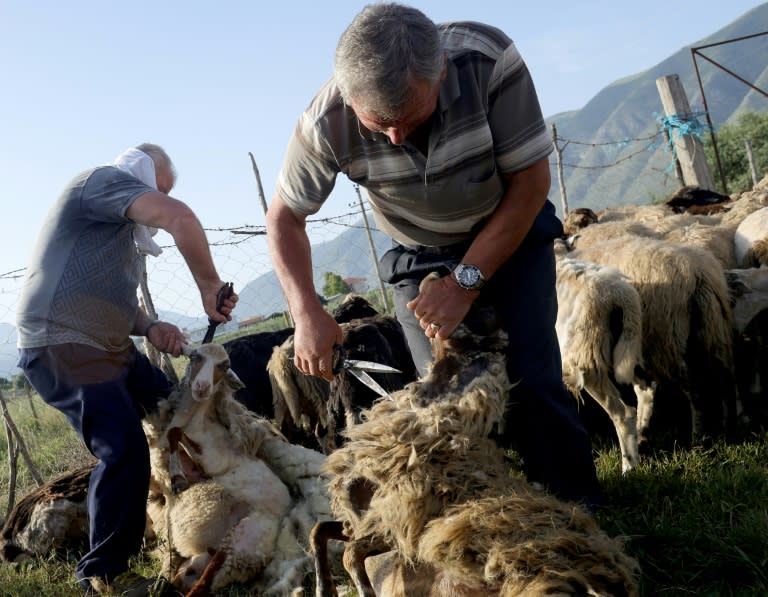Albania's shepherds race to save sheep from crushing heatwave

A crushing heatwave has forced shepherds in southern Albania to rush forward the shearing of their sheep to save them from suffocating in their wool coats under the soaring temperatures.
In the Dukat plain, which runs from the Ceraunian (Thunderbolt) Mountains to the Adriatic Sea, temperatures are already reaching 40 degrees Celsius (104 Fahrenheit) and beyond.
The shearers have been forced to start work at dawn and finish by late morning to escape the worst of the exceptional heat.
The sheep, weighed down by the thick coats and packed tightly together in a small enclosure, bleat as they wait to be sheared in the scorching sun.
The bells around their necks punctuate the clip of the shears and the chat of the shepherds as they work.
"The heatwave of the past few days, with temperatures suddenly abnormally high" meant the shepherds had to move fast, biologist Nexhip Hysolokaj told AFP.
Shearing normally takes place at the end of June but the brutal change in climate has forced shepherds to bring it forward.
The sheep were struggling, said Hysolokaj. "Unexpected heatwaves can be fatal" for them, he added.
Unshorn sheep are at far more risk because their wool prevents their sweat from evaporating.
- Clipped the traditional way -
"They can stand the cold," said 64-year-old shepherd Syrja Brahimi as he clipped away at a sheep.
"But they have a lot of problems with the heat, so we have to hurry up and get rid of the wool that suffocates them."
Brahimi invited his friends friends and fellow shepherds to help him shear his 150-strong flock.
He in turn will help shear and deworm the flocks of each one of his colleagues, before they move their sheep up into the mountains over the summer.
Despite the urgency this year, the days of shearing are also a period of celebration as the shepherds gather.
And here, they still do it the traditional way, hand-clipping their sheep rather than using electric shears.
"It's more human," said Syrja.
As the hours pass -- and the heat rises -- the silence is gradually replaced by the good-natured chat of a day among friends.
Bread and cheese washed down with coffee and raki -- a traditional brandy popular in Albania and much of the Balkans -- help make the hard work and punishing heat easier to bear.
- 'Our children' -
"You have to finish the job before 10:00 am to protect the sheep from the scorching sun," said another shepherd, 61-year-old Feim Koci. He was already drenched in sweat.
"I started shearing my first sheep at the age of 15, a difficult job but one I've done with love," he added.
"Ewes and rams are our children, our family, our life.
Koci, his head and neck covered with a white blouse to protect him from the sun, plucked another sheep from the flock and readied his shears.
"One has to be very careful when using the shears in order not to traumatise the animal by cutting its skin and hurting it", he said.
"The animal needs to feel reassured," he explained. "We talk to it, stroke it... It has to understand that nothing bad is going to happen to it."
Koci sharpened his shears on a whetstone before starting on the next sheep.
Once he was done, he moved it quickly moved to the shade of a makeshift tent covered with ferns -- for even shorn, he said, the sheep were still at risk from heatstroke.
- 'We won't give up' -
This year's higher temperatures have not only brought forward the shearing season, it has also affected milk production, said Brahimi.
From 65 kilogrammes (143 pounds) per ewe last year, they are now down to 50, he said.
But the shepherds are holding on.
"As long as we're alive, we won't give up," said Koci. "We'll find solutions to save our sheep.
"But here we're all over 60, there are no young people remaining in the village, they've all left for the city or abroad.
After all the hard work, they still won't be able to sell their wool. This was about saving the sheep rather than going to market.
With world prices as low as they are, they cannot give the wool away, so it will end up being dumped.
"These sheep will finish at the butcher. There's no other choice," said Brahimi.
He could not keep the tears from his eyes.
bme/cbo/ljv/jj

 Yahoo News
Yahoo News 
